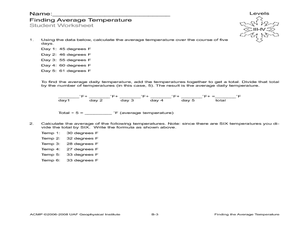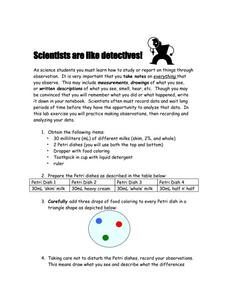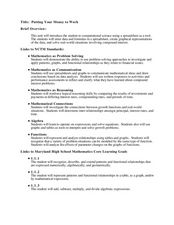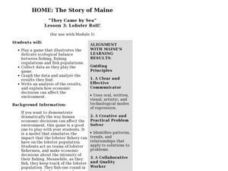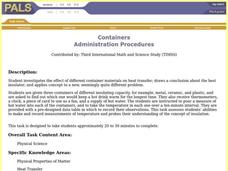Curated OER
Why Is Our Stream Changing?
Students test turbidity, pH, oxygen content and temperature of local stream. In this earth science lesson plan, students collect and record data from the experiment. They analyze findings and present it to class.
Foundation for Water & Energy Education
How is Flowing Water an Energy Source? Activity C
Can the force of falling water through a tube vary by altering the diameter of the tube or its height? That is what physical scientists aim to discover in this activity, the third in successively more revealing activities on the power of...
Teach Engineering
Alloy the Way to Mars
Future engineers test different alloys to determine the specific strength of each one. Based on the results, they make a recommendation to NASA on which alloy to use on engines for spacecraft.
Curated OER
Acid Rain Keeps Falling on My Head
Students examine the pH level of rain water in their local community. They locate each location on a map. They analyze the data and draw conclusions.
Curated OER
Superhumans and Bionics: Building Hi-Tech Exoskeletons
Students explore how the body works. Students experiment and participate in activities to compare speed to stride length. Using the data collected, students draw conclusions about the biology of dinosaurs, their speed and stride length.
Curated OER
Health: How's Your Heart?
Students examine human physiology by measuring heart rates and conditions that influence them. To determine the difference in heart rates, they take their pulses at rest and after jogging in place. Once the data is collected, students...
Curated OER
Finding the Average Temperature
Pupils calculate averages. In this average temperature lesson, students collect data and use their problem solving skills to calculate average temperatures.
Curated OER
Putting Your Best Foot Forward
Third graders measure their feet and their parents' feet, record data on computer-generated graphs, and calculate and record mean, median, and mode.
Curated OER
Scientist Are Like Detectives
Students demonstrate proper scientific observation skills. In this investigative science lesson plan, students make observations, record their findings and form conclusions in order to improve their scientific documentation and writing...
Curated OER
What is a Living Thing, and How Does a Living Thing Respond to Its Environment?
Pupils investigate how living things interact with their environment. In this living things lesson plan, students complete lessons for science investigations on what living things have in common. Pupils study cells, complete...
Curated OER
Introduction to Dissolved Oxygen and Demonstration of a Simple Test Procedure
Students explain the importance of dissolved oxygen in water ecosystems. They describe the aquatic oxygen cycle and the effect of water pollution on oxygen. They make observations, collect data and draw a conclusion.
Curated OER
Get the Picture?
Students explore the movement to design low-cost solutions for the world's population and create a graph to represent the information. In this design and graphing lesson, students review the concepts of graphing and visit the...
Curated OER
Putting Your Money to Work
Students create a collect data on expenses. In this algebra lesson, students create a spreadsheet to solve scientific equations. They incorporate math, science and technology in this lesson.
Curated OER
Mathematical Models with Applications: The Sounds of Music
Students use an electronic data-collection device to model the sound produced by a guitar string. They identify the graph of a periodic situation and use the graph to determine the period and frequency of sound waves.
Curated OER
Electric Circuits
Fourth graders investigate complete and incomplete circuits. Using an electrical kit that includes a D-cell battery, wiring, and a flashlight bulb, they construct a complete electric circuit that will light the light bulb. Students...
Curated OER
Who Does the Lottery Benefit?
Students investigate the pros and cons of the lottery. In this algebra instructional activity, students use the formulas for permutation and combination to test their arguments about the lottery. They collect data about their argument...
Curated OER
Can't You Make Them Behave, King George?
Fifth graders describe the changes in King George III's policy toward the American colonies by sequencing key events between the French and Indian War and the American Revolution. They explain the colonial reactions to command decisions...
Curated OER
Statistical Sampling
Students collect data in the field and analyze it in class using tables and graphs to determine how many observations of a phenomenon are necessary to draw valid conclusions.
Curated OER
Math and Cinderella
Students trace their feet and them compare the different sizes of classmates. They construct a bar graph showing the results of their classmates' feet size. They discuss what kinds of conclusions can be drawn from their observations.
Curated OER
Lesson 3: Lobster Roll!
Students play a game that illustrates the delicate ecological balance between fishing, fishing regulations and fish populations. They collect data and analyze the results.
Curated OER
The Three Gorges Dam- Should it be Completed?
Pupils research and analyze the geographic problem of whether or not the Three Gorges Dam should be completed. Students take a position on the issue, gather information related to their position, present their conclusions, and write a...
Curated OER
Homology
Students investigate the concept of homology. They are particularly interested in finding information about developmental homology. Students design a new animal correcting obvious mistakes on a worksheet provided by the teacher. They...
Curated OER
Containers
Students investigate the effect of different container materials on heat transfer; draws a conclusion about the best insulator; and applies concept to a new, seemingly quite different problem.
Curated OER
Science and the Scientific Process
Students investigate the characteristics of different soil samples. In this physical science lesson plan, students play the role of forensics solving a crime by matching soil from the suspect's shoes. They formulate a conclusion after...








